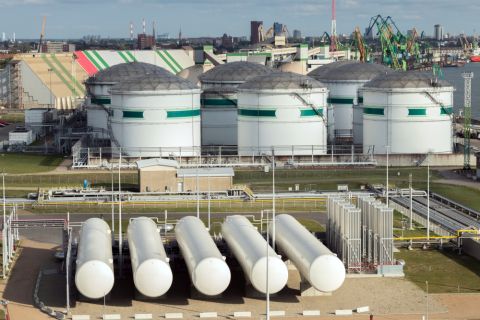
Oil and natural gas will always be fossil fuels, but there’s no reason why the processes surrounding them can’t be cleaner now and in the future, writes Henry Berry, director at Tristone Holdings. (Source: Hart Energy; Shutterstock.com)
Being situated in the most environmentally conscious era of all time, the need to adopt more environmentally sustainable practices is increasingly apparent. This necessity is not lost on oil and gas companies. In fact, given that they’re so often targeted as being the root cause of the climatic problems, they’re amongst the most aware of the need for change.
Here are some of the more innovative ways in which oil and gas developments around the world are looking to go greener.
Recycling
There is an increasing demand, from all corners of the globe, for a mass reduction of the amount of single-use plastics that are produced, sold and ultimately thrown away. The recycling process is something that many major oil companies are looking to incorporate into their oil and gas developments, and rightly so. It’s indisputable that these plastics have a vast negative impact on our world’s climate and ecosystems. Fortunately, oil companies, and other petrochemical firms across the globe, are in a position to help drive this change without having to compromise on their own developments.
Few industries have the kind of access to the waste materials provided by plastic-processing plants that the oil and gas industry does. Rubber and textiles join single-use plastics in their ability to be recycled down into raw, component materials. This, mixed with the existing infrastructural and financial capabilities that oil and gas companies possess, lead to recycling being a viable option in the near future.
Freshwater Usage
A large quantity of freshwater is traditionally required for some of the main processes within the oil and gas industry. Despite freshwater wastage being significantly reduced in recent years through means of recycling, there is a longing for the industry to reduce the initial amount of freshwater required to fulfill these essential processes.
This can be achieved by reusing freshwater for multiple processes, rather than just one—two birds with one stone, in simplified terms. Utilizing more intense filtration methods and water contamination treatment should enable oil companies to cut down on their freshwater usage and wastage.
Tightening Up Inefficiencies
Waste, excess and used oil was a big problem in the oil industry for a very long time. This inefficiency was one of the most environmentally damaging parts of the industry, but now, oil companies have the ability to convert waste oil into usable diesel. The drilling rigs, themselves, may be powered by this diesel, or alternatively it can be used for other market purposes. It is clear that processes like these can help to produce essential fuel when it is in demand, and that there is no need for an abundance of oil to go to waste. By utilizing this recycling process, the entire industry cycle becomes much more efficient.
Smarter software and artificial intelligence are also gradually being implemented to target these inefficiencies. If oil companies are able to receive more accurate data insights from their computing systems, more resource wastage can be highlighted and, consequently, oil companies will be able to more easily streamline their operations. Utilizing more advanced technology where possible is an excellent option as it is quite clearly beneficial from both an environmental and commercial standpoint.
Methane Leaks
Methane is around 80 times as damaging as CO₂, making it one of the most harmful greenhouse gases, in terms of impact upon our climate. Regrettably, methane leakages are a relatively common occurrence in the natural gas production chain—regardless of whether this be processing or distribution. With this in mind, oil and gas companies have been eager to keep these leakages to a minimum wherever possible. Huge oil companies, like Exxon Mobil Corp., are pledging vast sums of money to emission-cutting technologies. Alternatively, many other companies are seeking to implement polyethylene pipelines, which leak far less methane than steel pipelines.
Conclusion
Oil and natural gas will always be fossil fuels, but there’s no reason why the processes surrounding them can’t be cleaner now and in the future. With this in mind, it is imperative that oil and gas companies across the globe take the initiative to review their processes and implement some greener alternatives.
About the Author:
Henry Berry is a director at Tristone Holdings Ltd., an energy company based in the U.K. with a primary focus in the U.S. Tristone finds, develops and produces essential sources of energy and their portfolio includes high-quality conventional oil and natural gas assets in the top U.S. onshore plays. The company is currently raising capital to acquire and expand its energy base, specifically in the oil and gas sector.
Recommended Reading
Tellurian Exploring Sale of Upstream Haynesville Shale Assets
2024-02-06 - Tellurian, which in November raised doubts about its ability to continue as a going concern, said cash from a divestiture would be used to pay off debt and finance the company’s Driftwood LNG project.
Which Haynesville E&Ps Might Bid for Tellurian’s Upstream Assets?
2024-02-12 - As Haynesville E&Ps look to add scale and get ahead of growing LNG export capacity, Tellurian’s Louisiana assets are expected to fetch strong competition, according to Energy Advisors Group.
‘Unexpected’ JV to Move Permian NatGas to Gulf Coast LNG Terminals
2024-03-26 - A trio of midstream companies—Enbridge, Whitewater and MPLX—will work together to build infrastructure to transport Permian Basin natural gas to Gulf Coast LNG terminals.
ONEOK CEO: ‘Huge Competitive Advantage’ to Upping Permian NGL Capacity
2024-03-27 - ONEOK is getting deeper into refined products and adding new crude pipelines through an $18.8 billion acquisition of Magellan Midstream. But the Tulsa company aims to capitalize on NGL output growth with expansion projects in the Permian and Rockies.
Woodside, Santos Scrap M&A Talks for $52B Combination
2024-02-07 - After nearly two months of due diligence and negotiations, Woodside did not offer a firm bid price for Santos, sources said.




